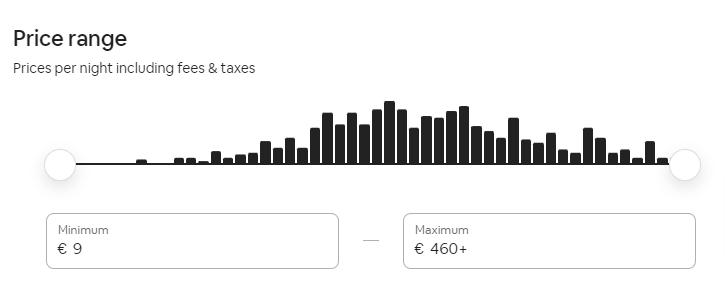I have a table filled with pre-calculated prices for rental objects. This is a simple version of it:
CREATE TABLE `pricecache` (
`oid` int(11) NOT NULL DEFAULT '0',
`start` date NOT NULL,
`end` date NOT NULL,
`duration` tinyint(3) UNSIGNED NOT NULL,
`guests` tinyint(3) UNSIGNED NOT NULL DEFAULT '0',
`child` tinyint(3) UNSIGNED NOT NULL DEFAULT '0',
`animal` tinyint(3) UNSIGNED NOT NULL DEFAULT '0',
`price` float NOT NULL DEFAULT '0',
`stamp` datetime NOT NULL
) ENGINE=InnoDB DEFAULT CHARSET=utf8mb4 COLLATE=utf8mb4_unicode_ci;
INSERT INTO `pricecache` (`oid`, `start`, `end`, `duration`, `guests`, `child`, `animal`, `price`, `stamp`) VALUES
(1162, '2023-11-01', '2023-11-08', 7, 1, 0, 0, 679, '2023-10-27 17:00:02'),
(1162, '2023-11-01', '2023-11-08', 7, 2, 0, 0, 679, '2023-10-27 17:00:02'),
(1162, '2023-11-01', '2023-11-08', 7, 3, 0, 0, 679, '2023-10-27 17:00:02'),
(1162, '2023-11-01', '2023-11-08', 7, 4, 0, 0, 679, '2023-10-27 17:00:02'),
(1162, '2023-11-01', '2023-11-08', 7, 5, 0, 0, 679, '2023-10-27 17:00:02'),
(1162, '2023-11-01', '2023-11-08', 7, 6, 0, 0, 679, '2023-10-27 17:00:02'),
(1162, '2023-11-02', '2023-11-09', 7, 1, 0, 0, 679, '2023-10-27 17:00:02'),
(1162, '2023-11-02', '2023-11-09', 7, 2, 0, 0, 679, '2023-10-27 17:00:02'),
(1162, '2023-11-02', '2023-11-09', 7, 3, 0, 0, 679, '2023-10-27 17:00:02'),
(1162, '2023-11-02', '2023-11-09', 7, 4, 0, 0, 679, '2023-10-27 17:00:02'),
(1162, '2023-11-02', '2023-11-09', 7, 5, 0, 0, 679, '2023-10-27 17:00:02'),
(1162, '2023-11-02', '2023-11-09', 7, 6, 0, 0, 679, '2023-10-27 17:00:02'),
(1162, '2023-11-03', '2023-11-10', 7, 1, 0, 0, 679, '2023-10-27 17:00:02'),
(1162, '2023-11-03', '2023-11-10', 7, 2, 0, 0, 679, '2023-10-27 17:00:02'),
(1162, '2023-11-03', '2023-11-10', 7, 3, 0, 0, 679, '2023-10-27 17:00:02'),
(1162, '2023-11-03', '2023-11-10', 7, 4, 0, 0, 679, '2023-10-27 17:00:02'),
(1162, '2023-11-03', '2023-11-10', 7, 5, 0, 0, 679, '2023-10-27 17:00:02'),
(1162, '2023-11-03', '2023-11-10', 7, 6, 0, 0, 679, '2023-10-27 17:00:02'),
(1162, '2023-11-04', '2023-11-11', 7, 1, 0, 0, 679, '2023-10-27 17:00:02'),
I want to get the lowest price each day and the number of objects which have that price. I tried this:
SELECT oid, ROUND(MIN(price)/duration, 0) xprice
FROM `my_cache`
WHERE `price` > 0
GROUP BY ROUND(price/duration, 0)
ORDER BY `xprice` ASC
but this way I still see redundant/ungrouped xprice values.
I want to display the data as a price filter similar to airbnb:
How can I do this?

 Question posted in
Question posted in 


2
Answers
Here are some hints on what this could be about. There is no expected result and there are some issues in the OP’s code. It is unclear what is "lowest day price of every object". Some of the possibilities with the sample data provided could be:
If you want to display items per day, you need to group by the day rather than the price. And to do that you’ll need a calendar table.
In this case, to show all rows that have the minimum price for each day, I’d also use
dense_rank()rather thanGROUP BY.And then to further get the final number of items each day:
You can see them run here:
But you won’t see much, because the provided sample data is not meaningful: all of the price and date values are the same.